ISLAMABAD: Prime Minister Imran Khan approved the basic framework of a new National Education Policy on Friday, the Joint Adviser to the Ministry of Education and Professional Training Muhammad Rafique Tahir confirmed on Saturday to Arab News.
The ministry is still working on the policy and keeping details under wraps. Officials declined to comment on the highlights of the framework presented to the PM, but said the full policy would formally be announced on November 26, after Khan’s approval.
Tahir told Arab News that the current education policy, formulated in 2009, was outdated. The only important aspect of the upcoming policy that he revealed related to Article 25-A of the Constitution, which obliges the state to provide free, compulsory, quality education to children aged between five and 16, saying that the government wanted to take that provision more seriously.
Describing Pakistan’s education system as “fragmented and apartheid,” the prime minister decreed earlier this week that major changes would be made to state-run education in the country by implementing a blanket National Education Policy.
In his maiden speech after his election victory, Khan pledged to serve the cause of education in Pakistan by improving public education.
Identifying the challenges inherent in that exercise, Federal Minister of Education and Professional Training Shafqat Mahmood cited “out-of-school children, education apartheid, quality of education and skill-development issues,” in a statement.
Mahmood said the new education policy would ensure that all children received a “fair and equal opportunity to receive a high quality of education in order to achieve their full potential.”
The statement said that this required “optimum utilization of the existing infrastructure, the employment of technology solutions, improvement in non-formal education systems, quality teachers and that education be incentivized.”
UNICEF official Ellen Van Kalmthout told Arab News, “The new government’s (focus) on bringing all children to school — including through investment in accelerated learning programs for the large group of children and adolescents who have never gone to school — is critically important.
“A key challenge in Pakistan is the high number of children out of school — 22.8 million according to the latest government data — of whom the majority have never gone to school,” she continued. “Equity is a major concern. Girls, poor children, and children in rural areas are most likely to be out of school or to dropout, or fail to continue to middle or secondary school or connect with employment.
“Another challenge is that learning levels are low. Government assessment data on learning shows that the national average scores of grade 4 and grade 8 students do not meet acceptable achievement levels in core subjects,” Kalmthout added.
But that situation “appears worse,” wrote “educationist” Shahid Siddiqui in his recent op-ed in The News International, “if we consider the fact that 35 percent of schoolchildren drop out before they reach the eighth grade.” He contended that Pakistan had “one of the highest school dropout rates in the world.”
The standards of government education in Pakistan have long been unsatisfactory, so some parents have chosen to enroll their children in often prohibitively expensive private schools — something the vast majority of Pakistanis simply cannot afford, making it even more pressing that the government take appropriate measures to address the situation.
Pakistan’s urban areas have a much higher literacy rate (74 percent) compared to 49 percent in rural territories, according to the latest Economic Survey of Pakistan. And that gap continues to widen. The country’s overall literacy rate is 58 percent — down two percent from the fiscal year 2015-2016.
Siddiqui argued that the country’s failure to provide all children with adequate education has led to an increase in “frustration and extremism” in Pakistan.
The prime minister has publicly promised to offer solutions to these problems, and the new education policy will indicate just how well he has managed to do so.
“The global benchmark for spending on education is four percent of GDP (gross domestic product),” said UNICEF’s Van Kalmthout, adding that Pakistan is well below that target, spending an estimated 2.6 percent of GDP on education.
Pakistan to unveil revamped education policy later this month
Pakistan to unveil revamped education policy later this month
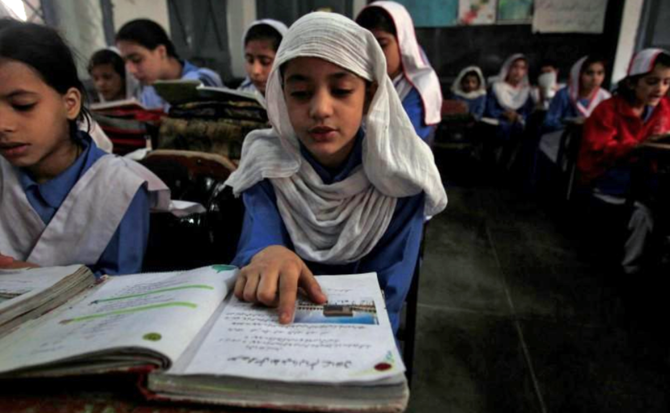
- Framework of National Education Policy approved, with over 22 million children out of school
- Government says it will ensure free high-quality education
Lahore, Islamabad courts challenge Pakistan media regulator’s ban on reportage of court cases
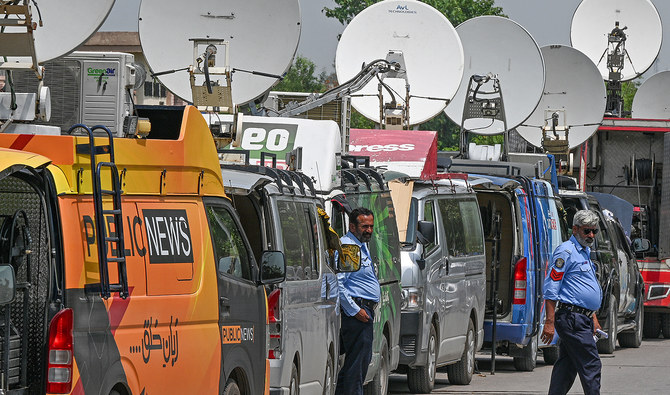
- PEMRA ban came amid tensions between government, courts over alleged kidnapping of poet Ahmad Farhad
- Farhad’s family says he was abducted from his home on May 14 by officials from the military’s ISI spy agency
ISLAMABAD: The Lahore and Islamabad high courts on Friday issued notices to the Pakistan Electronic Media Regulatory Authority (PEMRA) while hearing petitions challenging a ban by the regulator on TV channels airing news, opinions and commentary on proceedings of ongoing court cases.
PEMRA announced the ban on Tuesday amid tensions between the government and the Islamabad High Court over hearings into the alleged kidnapping of Kashmiri poet Ahmad Farhad from outside his home on May 14. The poet’s family has filed a case with the IHC and accused Pakistan’s Inter-Services Intelligence spy agency of being behind his disappearance over social media posts critical of the military. The army has not commented on the development or the accusations by the family.
Pakistan media had been extensively reporting on the hearings of the case this week, with the high court directing authorities to produce the missing poet within four days and fiercely criticizing intelligence agencies for overstepping their jurisdiction.
“The Lahore High Court (LHC), during the hearing of pleas conducted by Justice Abid Aziz Shaikh, also ordered the electronic media watchdog to respond to its notice on May 29,” Pakistan’s Geo News reported. Multiple other Pakistani news websites also reported that the LHC and IHC had sent notices to PEMRA over the ban.
Petitioners against the PEMRA ban have said it is in violation of Article 10-A, 19 and 19-A of the constitution of Pakistan, which pertain to the right to a fair trial as well as freedom of speech and right to information. One of the pleas also requested the court to reject the prosecutor’s plea and declare it “inadmissible” and the PEMRA notification “null and void.”
Petitions challenging the ban have been filed in the Sindh, Lahore and Islamabad high courts as well as the Supreme Court.
Journalists in Pakistan are increasingly reporting on growing media censorship, with many blaming Pakistan’s powerful military for putting pressure on critical voices. The military has repeatedly denied it suppresses the press.
“TV channels are directed to refrain from airing tickers/headlines with regard to court proceedings and shall only report the written orders of the court,” the PEMRA notification said on Tuesday.
The regulator also directed TV channels to air “no content including commentary, opinions or suggestions about the potential fate of sub judice matter which tends to prejudice the determination by a court, tribunal.”
However, PEMRA allowed TV channels to report on court proceedings if they were broadcast live by the judiciary.
Pakistan approves $8 million to pay severance packages of PIA-owned Roosevelt Hotel in New York
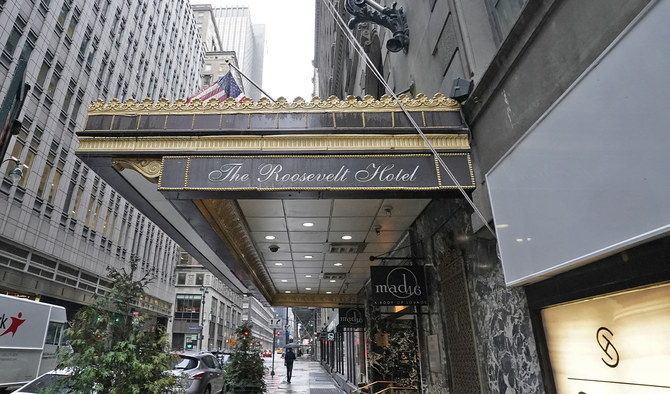
- Pakistan’s national airline bought the Roosevelt Hotel in 1999 for $36.5 million
- Islamabad is pushing for privatization of state entities for a fresh IMF bailout
ISLAMABAD: The Pakistani government on Thursday approved $8 million to pay severance packages of the Pakistan International Airlines-owned Roosevelt Hotel in New York, Pakistani state media reported, amid the South Asian country’s push for privatization of state entities.
The development came at an ECC meeting presided over by Finance Minister Muhammad Aurangzeb, during which the Ministry of Aviation presented a summary to allow the utilization of $8 million available with National Bank of Pakistan to pay severance packages of the establishment.
Roosevelt Hotel, a 19-story building located at a prime location in New York, was inaugurated in Manhattan on September 22, 1924. Named after the 26th President of the United States, Theodore Roosevelt, Pakistan’s national airline leased it in 1979 through the Pakistan International Airlines Investments Limited (PIA-IL).
Saudi Prince Faisal bin Khalid bin Abdulaziz Al-Saud was also one of the investors in the 1979 investment deal, though the PIA decided to buy the hotel for $36.5 million in 1999 and later struck a deal with its Saudi partner in 2005 to buy his share in the property as well.
“The Economic Coordination Committee (ECC) of the Cabinet on Thursday approved $8 million to pay severance packages and operational expenses of the Roosevelt Hotel,” the state-run APP news agency reported.
In 2021, the government of then prime minister Imran Khan had allowed the release of $27.3 million for the payment of liabilities accumulated by the hotel, which permanently closed its door on October 31, 2020, after remaining operational since 1924.
A year earlier, it had also approved $142 million for the PIA-IL last year to meet the hotel’s financial challenges.
The $8 million severance grant comes amid Pakistan’s push for privatization and reforms in state-owned enterprises (SOEs) as it negotiates with the International Monetary Fund (IMF) a fresh bailout program, for which Islamabad must implement an ambitious reforms agenda, including the privatization of debt-ridden SOEs.
Among the main entities Pakistan is pushing to privatize is its national flag carrier, the Pakistan International Airlines (PIA), while the government is putting on the block a stake ranging from 51 percent to 100 percent.
The South Asian country, which has been facing low foreign exchange reserves, currency devaluation and high inflation, last month completed a short-term $3 billion IMF program that helped stave off a sovereign default, but the government of Prime Minister Shehbaz Sharif has stressed the need for a fresh, longer-term program to keep the $350 billion economy afloat.
First batch of Pakistani Hajj pilgrims arrives in Jeddah
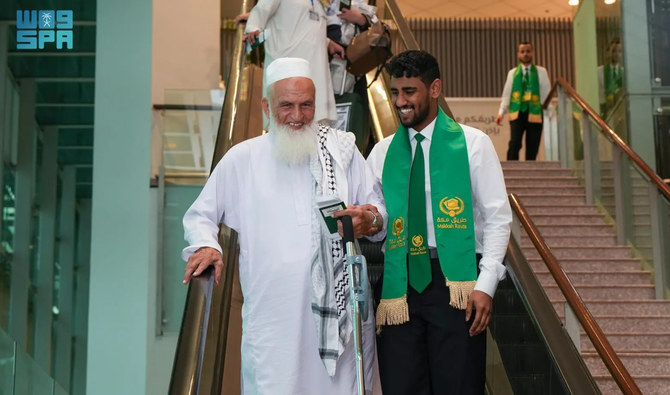
- A total of 34,316 Pakistanis reached Madinah by May 23 in first phase of Pakistan’s pre-Hajj flight operation
- As many as 114 flights will be transporting another 34,422 Pakistani pilgrims to Jeddah from May 24 to June 9
ISLAMABAD: The first batch of 720 Pakistani Hajj pilgrims arrived in Jeddah on Friday, Pakistani state media reported, a day after Pakistan diverted its pre-Hajj flights from Madinah.
Hajj is one of the five pillars of Islam and requires every adult Muslim to undertake the journey to the holy Islamic sites in Makkah at least once in their lifetime if they are financially and physically able.
These 720 Pakistani pilgrims departed from Islamabad and Karachi under the Makkah Route initiative and arrived via Saudia airline flights that landed at the King Abdulaziz International Airport, the APP news agency reported.
“The first flight SV-3705, with 370 passengers on board, arrived by 5 a.m. (local time) and the second SV-3727 landed at 6:10 a.m. carrying 350 Hajj pilgrims,” the report read.
Head of Pakistan Hajj Mission Abdul Wahab Soomro, Consul General Khalid Majeed and senior officials of the Pakistani Ministry of Religious Affairs as well as representatives of the Saudi government welcomed the pilgrims.
Under the Makkah Route initiative, the passengers directly left for their hotels avoiding long queues at the immigration counters and their luggage was shifted automatically to their residences.
In the first phase of Pakistan’s pre-Hajj flight operation, a total of 34,316 Pakistanis reached Madinah by May 23 through 146 flights, according to the report.
From May 24 to June 09, as many as 114 flights will be transporting 34,422 Pakistanis to Jeddah.
Pakistan has a Hajj quota of 179,210 pilgrims this year, of which 63,805 people will perform the pilgrimage under the government scheme, while the rest will use private tour operators.
This year’s pilgrimage is expected to run from June 14 till June 19.
Security of Chinese workers tops agenda as Islamabad, Beijing hold key investment meeting
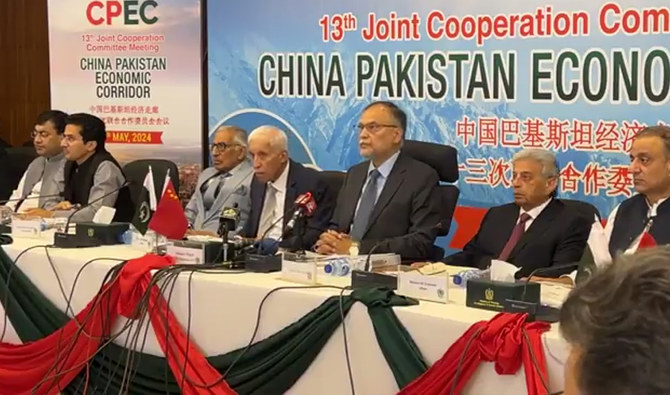
- Pakistan has said over 50 projects worth $25 billion under CPEC umbrella completed since 2015
- Chinese interests increasingly under attack in recent years by separatist and other militant groups
KARACHI: Pakistan and China are holding a virtual meeting of the 13th Joint Cooperation Committee (JCC) on the China-Pakistan Economic Corridor (CPEC) today, Friday, with the security of Chinese organizations and personnel working in the South Asian nation expected to be at the top of the agenda.
China is a major ally and investor in Pakistan but both separatist and other militants have attacked Chinese projects in recent months, killing Chinese personnel, including five Chinese workers who perished in a suicide attack on Mar. 26 while on their way to the Dasu hydropower project in Pakistan’s northwest.
The hydropower project falls under the ambit of CPEC, a flagship project of China’s Belt and Road Initiative through which it has pledged more than $65 billion for road, rail and other infrastructure developments in the South Asian nation of 241 million people. Pakistan has said more than 50 projects worth $25 billion under the CPEC umbrella have been completed since the project was launched in 2015.
On Friday, the 13th JCC meeting formally began with a minute of silence in honor of the Chinese nationals killed in the March suicide bombing, with Pakistan’s planning ministry describing them as “heroes of Pakistan” whose contributions had supported the realization of CPEC.
“China and Pakistan have embarked on a journey of shared dreams working hand in hand to build high-quality development projects,” Pakistani Planning Minister Ahsan Iqbal said in his opening remarks at the meeting. “It is heartening to note the steady progress CPEC has made since its inception in 2013.”
He lauded President Xi Jinping’s vision to forge an “upgraded version” of CPEC and turn it into a growth, livelihood-enhancing, innovation, green and regional connectivity corridor to align it with Pakistan’s 5E socio-economic framework approved last year for the promotion of exports, energy, environment, equity and empowerment.
“We are ready to work with NDRC [National Development and Reform Commission of China] to finalize the scope and implementation plan on these corridors,” Iqbal added.
The minister detailed a number of projects completed so far under CPEC, including the construction of around 888 kilometers of motorways and highways. He said an 884-megawatt hydropower project at Sukhi Kinari, worth $1.7 billion, was under construction and expected to be commissioner later this year.
Three hydel power projects and one coal-based Gwadar power project with a generation capacity of 2,100 megawatts were in advanced stages of completion, Iqbal added.
Beijing has also over the years readily provided financial assistance to bail out its often-struggling neighbor, including in July last year when China granted Pakistan a two-year rollover on a $2.4 billion loan, giving the debt-saddled nation much-needed breathing space as it tackled a balance-of-payments crisis.
But Chinese projects and interests have also increasingly come under attack in recent years.
The Dasu assault in March was the third major one in a little over a week on China’s interests and followed a Mar. 20 attack on a strategic port used by China in the southwestern province of Balochistan, where Beijing has poured billions of dollars into infrastructure projects including a deep-sea port, and a Mar. 25 assault on a naval air base, also in the southwest.
Both attacks were claimed by the Baloch Liberation Army (BLA), the most prominent of several separatist groups in Balochistan.
Dasu, the site of a major dam, has been attacked in the past, with a bus blast in 2021 killing 13 people, nine Chinese among them, although no group claimed responsibility, like the Mar. 26 bombing.
Pakistan is home to twin insurgencies, one mounted by religiously-motivated militants and the other by ethnic separatists who seek secession, blaming the government’s inequitable division of natural resources in southwestern Balochistan province.
Chinese interests are mostly under attack primarily by ethnic militants seeking to push Beijing out of mineral-rich Balochistan, but that area is far from the site of the Mar. 26 bombing.
On Thursday, Pakistan’s top economic body approved $2.5 million in compensation for families of Chinese workers who were killed in the Mar. 26 Dasu attack.
Authorities demolish part of Imran Khan’s Islamabad party office for ‘violating’ bylaws
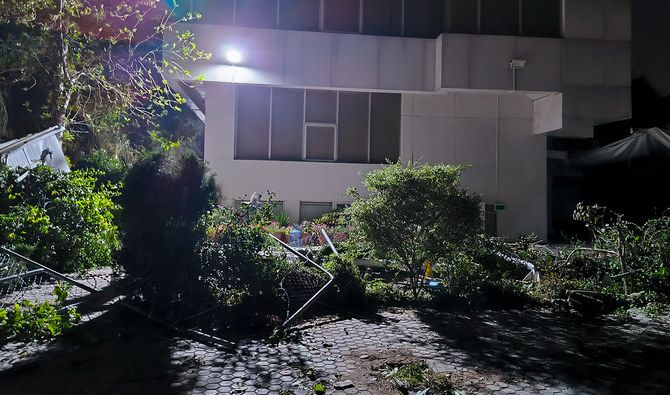
- Pakistan Tehreek-e-Insaf calls move ‘patently illegal and unlawful’
- PTI has complained of a widening state-backed crackdown on the party
ISLAMABAD: Local authorities on Thursday razed part of the Islamabad office of former prime minister Imran Khan’s Pakistan Tehreek-e-Insaf (PTI) over what they said was a “violation” of building by-laws, with the party calling on the top court to restrain authorities from doing ‘irreparable’ damage.
Officials and staff of the Capital Development Authority (CDA) arrived at the PTI Central Secretariat in the G-8/4 sector along with heavy machinery late on Thursday night and removed two shipping containers placed outside the building, as well as took down a guard room and a fence. They then sealed the office for alleged violations of city building bylaws.
“CDA operation over violations of building by-laws and to eliminate illegal constructions and encroachments,” the authority said on X. “Encroachments and illegal constructions on a plot by a political party in Sector G-8/4 are being removed.”
Sayed Zulfikar Bukhari, a senior spokesperson for the PTI and close Khan aide, said the party was neither served a notice, nor granted the opportunity for a hearing.
“This is patently illegal and unlawful,” he said in a statement. “We don’t have time to file a petition at this point of time. The Hon’ble CJ SCP [chief justice of the Supreme Court of Pakistan] may consider this message as an urgent application and direct Islamabad administration to refrain from causing such irreparable loss to the party.”
The PTI says it has been facing a state-backed crackdown, especially after May 9 last year when alleged Khan supporters ransacked government and military properties after the leader’s brief arrest on graft charges.
Hundreds of PTI supporters and leaders were arrested following the riots and many continue to remain behind bars as they await trial. The military has also initiated army court trials of at least 103 people accused of involvement in the violence. Many close Khan aides have since deserted him, due to what is widely believed to be pressure from the army, which denies interfering.
Khan, who was ousted in a parliamentary no-trust vote in April 2022, has been in jail since last August and convicted in four cases. He and the PTI say the May riots have been used as a ruse by political rivals and the military to weaken the party, which is arguably the most popular in Pakistan. Khan also says all cases against him are politically motivated and accuses the country’s powerful military and his political rivals of trying to keep him out of politics, an allegation they both deny.









